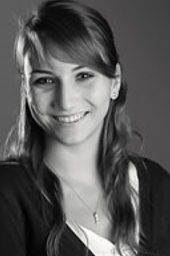An interview with Dr. des. Nicole Eberle
by John Scott Daly

Dr. des. Nicole Eberle is a temporary assistant professor with the School of English at HKU. She completed her PhD studies at The University of Zurich, in Switzerland. Her research interests include sociolinguistics, language variation and change, contact linguistics, lesser-known varieties of English, English varieties in the Caribbean, and dialect typology, as well as a more recently developed interest in the sociolinguistics of mobility.
JSD: Hi Nicole, and thanks for agreeing to be interviewed. I’m always curious about the reasons academics have for choosing their research interests. What do you think led you to become interested in these things?
NE: Growing up in a linguistic situation in Switzerland speaking one of the dialects that is often described as the least liked, I was often subject to comments about the way I spoke when I left the region. So, when I discovered that it was possible to study issues like perceptions of dialects and language in its social context, I felt drawn to these, and chose sociolinguistic courses whenever I got the chance. Sociolinguistics combines all aspects that I was interested in during my undergraduate studies because I also had anthropology as a minor, and the approaches, frameworks and questions that were raised there could also be related to sociolinguistics as it’s such an interdisciplinary field, which is one thing I enjoy especially.
The more recent interest in sociolinguistics of mobility has come out of the research setting I chose for my PhD, because I noticed how mobile Bermudians are and how this had a forceful impact on the linguistic situation. I wanted to follow up on these issues and what might be the potential consequences of acts and theorizations of mobility as well as the linguistic consequences these might have.
JSD: So far, what have been the most memorable events of your time in Hong Kong?
NE: I think academically speaking it’s difficult to pinpoint one particular event. I’ve very much enjoyed the discussions we’ve had in our Language in Society class because the concepts are familiar to me, but we apply them to and discuss them in a relatively new context, so I very much enjoy learning about this and applying theories and frameworks locally. Meetings that we have beyond the classroom are what I appreciate and enjoy particularly also because these are the moments where I can learn about local aspects, for example the particularities about the linguistic landscape in Kowloon which were discussed in one meeting with students from this class.
Non-academically speaking, I witnessed Kitchee’s historic first win in the Asian Champions League, which was the first win ever by a Hong Kong team in this championship. And the winning goal was scored by a young Hong Konger, which I found even more memorable considering the local football context.
JSD: A temporary assistant professorship is a chance to share your expertise, but I’m guessing it’s also a great opportunity to learn, too. What do you think will be the main lessons you take back to Switzerland with you?
NE: Apart from what I mentioned earlier about learning about the local context, what I’m learning most about is the approach to learning and teaching that might differ from culture to culture. I’ve not been exposed to different methods much previously, so it’s broadened my horizons quite extensively in terms of approaches to learning which vary depending on the education system that you’ve been through before starting at university, and how this impacts the way learning is perceived and the forms motivation can take. Actually, being in a new academic context is just so beneficial on so many levels that it’s difficult to pinpoint one particular thing. I’ve learnt about a new system, a new approach, a different curriculum.
JSD: Do you think you can you apply some of this back in Switzerland, then?
NE: Yes, definitely – not only the knowledge I’ve gained about this particular local context, which broadens my teaching repertoire, but also, I think I would recommend a period abroad even more to students than I have done in the past. I’ve always said that I’d recommend, say, a student exchange, but now I’d do it even more emphatically. This has been a great experience from so many angles: a linguistic angle, an academic angle, and a personal angle.
JSD: Finally, if you could invite a group of academics (past or present) to a dinner party, who would you invite, and why?
NE: I’d recreate the evening after my viva when I went out for a celebratory dinner with five colleagues. Although I’d like to invite many more people, that time I know was a lovely and wonderful evening, and I’d want to recreate that, because life is too short for bad dinner parties!

Our apologies, you must be logged in to post a comment.